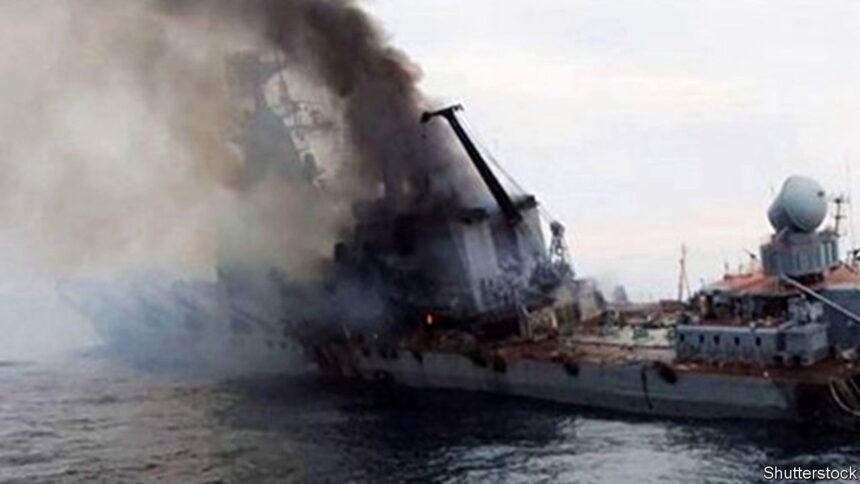Summary by Geopolist | Istanbul Center for Geopolitics:
In recent developments, the Russian Navy has withdrawn its last patrol ship from occupied Crimea, marking a significant moment in the ongoing Battle of the Black Sea. Ukrainian Navy spokesperson Dmytro Pletenchuk highlighted the historical significance with the words “Remember this day.”
Initially underestimated, Ukraine has proven resilient in challenging the dominance of Russia’s Black Sea Fleet since the blockade of Ukrainian ports in early 2022. Using a combination of domestic drones, Western-supplied weaponry, and strategic strikes, Ukraine has dealt substantial blows to the Russian fleet. By early 2024, a third of Russia’s initial seventy-four warships were either sunk or damaged, forcing a retreat to Novorossiysk in Russia and rendering the Black Sea Fleet functionally inactive by March 2024.
This success has disrupted Russian logistics, enabled Ukraine to resume commercial shipping, and bolstered its economic resilience. Despite these setbacks, Western reluctance to fully support Ukraine due to fears of escalation remains, inadvertently bolstering Putin’s position.
Russia’s retreat from Crimea makes a mockery of the West’s escalation fears
This week marked another milestone in the Battle of the Black Sea as the Russian Navy reportedly withdrew its last remaining patrol ship from occupied Crimea. The news was announced by Ukrainian Navy spokesperson Dmytro Pletenchuk, who signaled the historic nature of the Russian retreat with the words: “Remember this day.”
The withdrawal of Russian warships from Crimea is the latest indication that against all odds, Ukraine is actually winning the war at sea. When Russia first began the blockade of Ukraine’s ports on the eve of the full-scale invasion in February 2022, few believed the ramshackle Ukrainian Navy could seriously challenge the dominance of the mighty Russian Black Sea Fleet. Once hostilities were underway, however, it soon became apparent that Ukraine had no intention of conceding control of the Black Sea to Putin without a fight.
Beginning with the April 2022 sinking of the Russian Black Sea Fleet flagship, the Moskva, Ukraine has used a combination of domestically produced drones and missiles together with Western-supplied long-range weapons to strike a series of devastating blows against Putin’s fleet. Cruise missiles delivered by Kyiv’s British and French partners have played an important role in this campaign, but the most potent weapons of all have been Ukraine’s own rapidly evolving fleet of innovative marine drones.
The results speak for themselves. When the full-scale invasion began, the Russian Black Sea Fleet had seventy four warships, most of which were based at ports in Russian-occupied Crimea. In a little over two years, Ukraine managed to sink or damage around one third of these ships. In the second half of 2023, reports were already emerging of Russian warships being hurriedly moved across the Black Sea from Crimea to the relative safety of Novorossiysk in Russia. By March 2024, the Russian Black Sea Fleet had become “functionally inactive,” according to the British Ministry of Defense.
Ukraine’s remarkable success in the Battle of the Black Sea has had significant practical implications for the wider war. It has disrupted Russian logistics and hindered the resupply of Russian troops in southern Ukraine, while limiting Russia’s ability to bomb Ukrainian targets from warships armed with cruise missiles. Crucially, it has also enabled Ukraine to break the blockade the country’s Black Sea ports and resume commercial shipping via a new maritime corridor. As a result, Ukrainian agricultural exports are now close to prewar levels, providing Kyiv with a vital economic lifeline.
The Russian reaction to mounting setbacks in the Battle of the Black Sea has also been extremely revealing, and offers valuable lessons for the future conduct of the war. It has often been suggested that a cornered and beaten Vladimir Putin could potentially resort to the most extreme measures, including the use of nuclear weapons. In fact, he has responded to the humiliating defeat of the Black Sea Fleet by quietly ordering his remaining warships to retreat.
This underwhelming response is all the more telling given the symbolic significance of Crimea to the Putin regime. The Russian invasion of Ukraine first began in spring 2014 with the seizure of Crimea, which occupies an almost mystical position in Russian national folklore as the home of the country’s Black Sea Fleet. Throughout the past decade, the occupied Ukrainian peninsula has featured heavily in Kremlin propaganda trumpeting Russia’s return to Great Power status, and has come to symbolize Putin’s personal claim to a place in Russian history.
Conflict Crisis Management Europe & Eurasia Politics & Diplomacy
Crimea’s elevated status was initially enough to make some of Ukraine’s international partners wary of sanctioning strikes on the occupied peninsula. However, the Ukrainians themselves had no such concerns. Instead, they simply disregarded the Kremlin’s talk of dire consequences and began attacking Russian military targets across Crimea and throughout the Black Sea. More than two years later, these attacks have now become a routine feature of the war and are taken for granted by all sides. Indeed, the Kremlin media plays down attacks on Crimea and largely ignores the frequent sinking of Russian warships, no doubt to save Putin’s blushes.
The Russian Navy’s readiness to retreat from its supposedly sacred home ports in Crimea has made a mockery of Moscow’s so-called red lines and exposed the emptiness of Putin’s nuclear threats. Nevertheless, Kyiv’s international allies remain reluctant to draw the obvious conclusions. Instead, Western support for Ukraine continues to be defined by self-defeating fears of escalation.
For almost two and a half years, Ukraine’s partners have allowed themselves to be intimidated into denying Ukraine certain categories of weapons and restricting attacks inside Russia. This is usually done while piously citing the need to prevent the current conflict from spreading any further. Western policymakers apparently prefer to ignore the overwhelming evidence from the Battle of the Black Sea, which confirms that when confronted by resolute opposition, Putin is far more likely to back down than escalate.
The West’s fear of escalation is Putin’s most effective weapon. It allows him to limit the military aid reaching Kyiv, while also preventing Ukraine from striking back against Russia. This is slowly but surely setting the stage for inevitable Russian victory in a long war of attrition. Western leaders claim to be motivated by a desire to avoid provoking a wider war, but that is exactly what will happen if they continue to pursue misguided policies of escalation management and fail to stop Putin in Ukraine.
By: Peter Dickinson
Source: Atlantic Council







